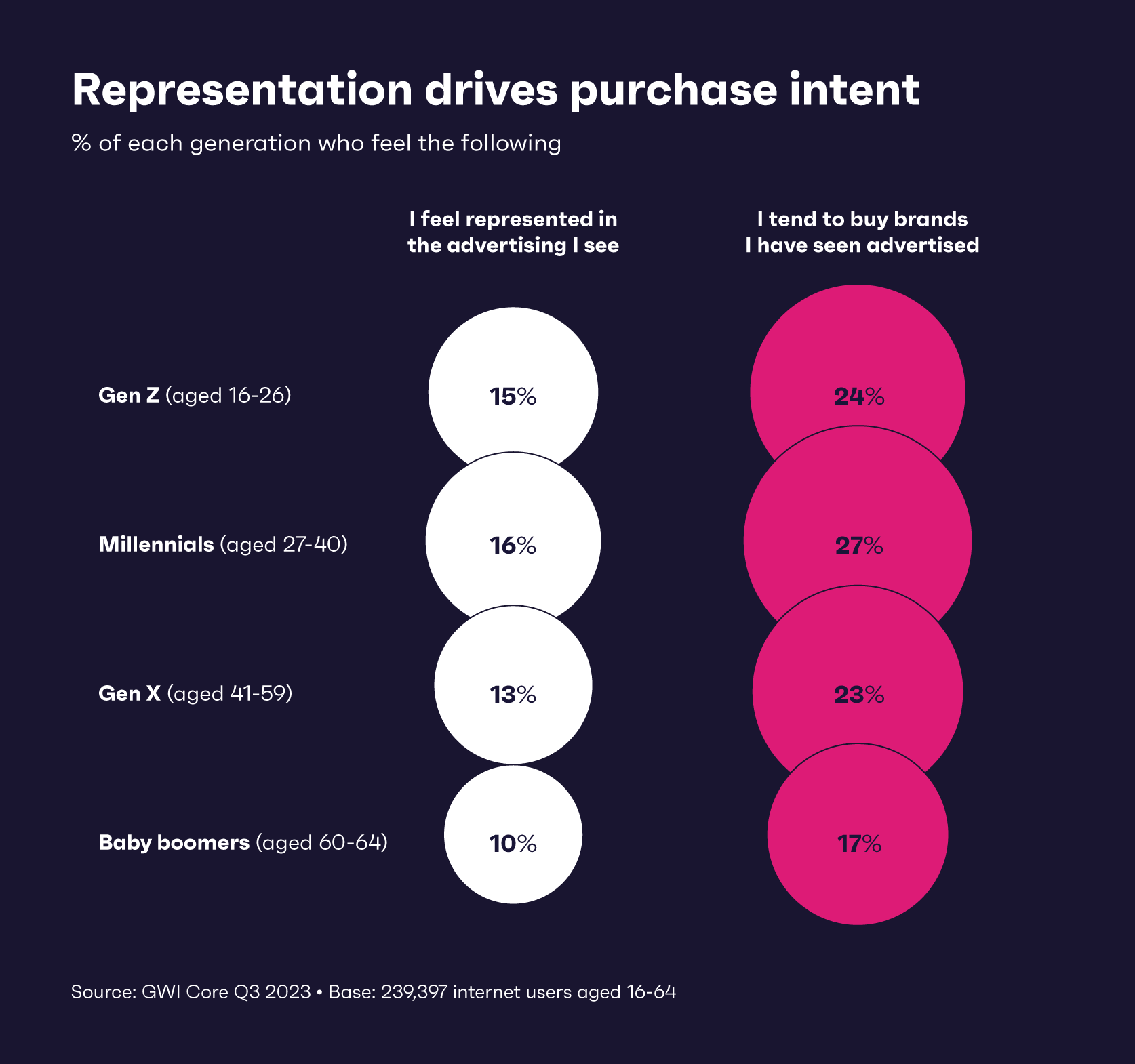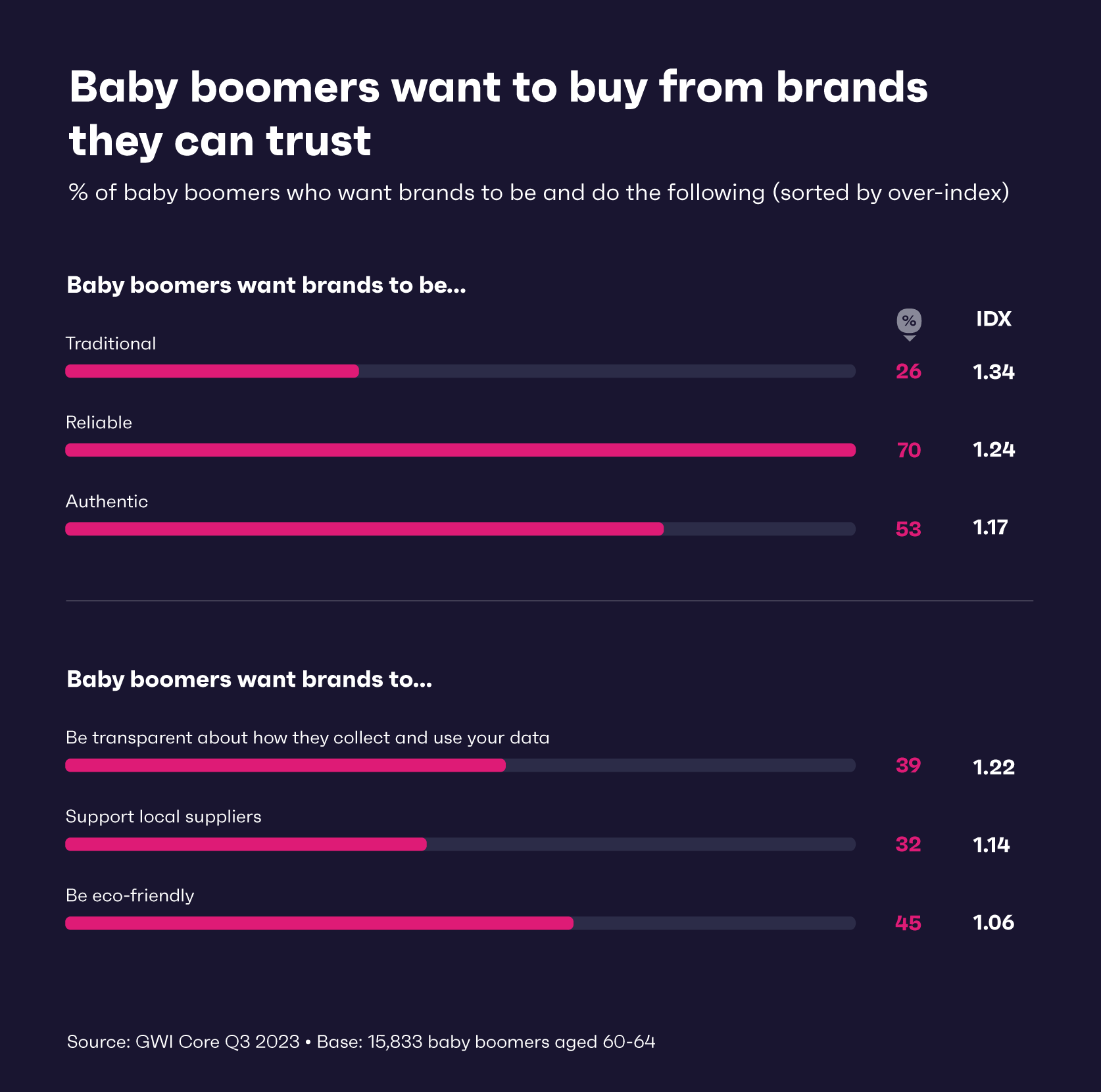A quick internet search of baby boomer stereotypes will inevitably return some common, and often unfavorable, narratives. But just how many, if any, of them are actually true? Baby boomers are one of the most diverse audiences around, so what’s fact and what’s fiction. We’re here to set the record straight.
Who are baby boomers?
Born between 1946 and 1964, baby boomers were raised during a time of economic prosperity, optimism, and social change. Now in their late 50s to 70s, baby boomers represent a diverse group of people – some are still working or have children at home, while others are retired and seizing the day.
As with any generation, there are stereotypes which surround boomers, but we’re only interested in the facts. So, after crunching the numbers, here’s 10 baby boomer characteristics worth knowing – according to real consumer data.
Top 10 baby boomer characteristics
- They’ve got cash to splash
- Boomers are still very much a part of the workforce
- Their social media footprint is growing
- More boomers are moving towards content creation
- Baby boomers are more tech-savvy than you may think
- Current advertising doesn’t resonate well with them
- Boomers are advocates for the environment
- Baby boomers want brands to be authentic and traditional
- They’re avid gamers
- Baby boomers are a happy-go-lucky bunch
1. Baby boomers have got the cash to splash
Baby boomers are said to be the generation who were in the right place at the right time, making them the wealthiest generation on the planet. This wealth, combined with the freedom that comes with a later stage of life, means they’re able to splurge more than younger consumers.
Globally, compared to Gen Z, baby boomers are more likely to say they buy new products online each week, own a credit card, and have high purchasing power.
They have cash stashed away too. Over 4 in 10 baby boomers who save money say their current financial reserves would cover basic living expenses for 6 months or more.
Not only that, but they even share pretty similar spending behaviors with their younger counterparts. If we look at what Gen Z and baby boomers are planning on buying in the next 6 months, a vacation is at the top of both their lists.
When tapping into baby boomers, brands should move beyond assumptions and stereotypes and appeal to their interests and values. This generation has strong purchasing power, but marketers need to understand their needs based on real consumer data.
2. Boomers are still very much a part of the workforce
Marketers often portray baby boomers enjoying carefree retirements; some are, but it’s not representative of the whole generation.
Far from putting their feet up, almost 4 in 10 baby boomers are either in full-time employment or are self-employed.
While it’s fair to suggest that some are still working to give themselves a cushion for retirement against the rising cost of living, around a fifth describe themselves as ambitious and career-focused; they generally enjoy working. Nearly 8 in 10 are satisfied with their current job, while retired consumers in this generation are just as likely as their working counterparts to describe their mental health as good or excellent.
Among those who are satisfied with their job, our research highlights the importance they place on setting strong objectives – they stand out for saying they have a clear understanding of their personal goals and the company’s strategy.
As baby boomers have been working for longer than younger generations, they hold a wealth of knowledge which companies will want to hang onto for as long as possible. Our research not only helps marketers better understand how to portray this generation, but also gives businesses a heads up on how to keep baby boomers happy in the workplace.
3. Their social media footprint is growing
Gen Z are often criticized for spending too much time on their phones, but out of all generations, baby boomers are the ones spending increasingly more time on social media.
Over the last two years, the amount of time they spend on social media has grown by almost 10 minutes, while Gen Z time fell 12 minutes.
As platforms shift their focus to short form, visual, and video content, baby boomers are keeping up with these trends. As you may have guessed, Facebook is their favorite platform, but the number of boomers who regularly use Instagram and TikTok is climbing. And with that, comes some interesting shifts in behavior…
4. More boomers are moving towards content creation
It probably won’t come as a surprise that content creation is still more popular among Gen Z than baby boomers.
But the number of boomers who’ve shared their own blog post or video in the last year has grown 11%, while the number of Gen Z who have has fallen by 12%.
As older consumers increasingly engage with social media, they’re also moving into content creation. And it’s creating a buzz, not just among their peers, but younger audiences too.
Gym Tan is a good example here. The 60-something TikToker has over 190,000 followers and has gained popularity for her fashion and beauty videos. Demonstrating her influence, last year a dress Gym wore in one of her videos quickly sold out on Abercrombie & Fitch’s website after gaining exposure from her modeling it on TikTok.
Now, brands are beginning to take notice as more companies reach out to older influencers to form partnerships.
5. Baby boomers are more tech-savvy than you may think
It’s often assumed that older generations lack technological confidence compared to their younger counterparts, but it turns out boomers are actually pretty big tech adopters.
While generational tech confidence gaps exist in some markets, the narrative fluctuates worldwide.
Baby boomers in several countries actually maintain stronger tech confidence than the general population.
In markets like France, Greece, and Spain for example, boomers are less likely than the average population to say they’re confident using new technology. But for boomers in the likes of Turkey, Sweden, and the UAE, the opposite is true. Just another reminder that some of the characteristics of this generation could do with a rethink.
6. Current advertising doesn’t resonate well with them.
Another baby boomer characteristic is that they feel advertising is missing the mark. The tech company CreativeX analyzed thousands upon thousands of global ads and found that just 4% of those cast in them were aged 60 or above.
As such, they’re the generation least likely to feel advertising is representative of them, and the least likely to buy from brands they see advertised too.

Many advertisers can fall into the trap of portraying stereotypes when it comes to representing older audiences, which can be inaccurate and harmful. For example, a common stereotype is that baby boomers are less progressive than other generations, which our data proves to be untrue.
Baby boomers are more likely than the average consumer to be interested in other cultures, believe everyone should have equal rights, or even that immigration is good for their country – especially in markets like South Africa, Croatia, and Portugal.
This is where brands may be coming unstuck with this audience. The more represented consumers feel, the more responsive they’re likely to be to brands that have made an effort to resonate with them.
7. Boomers are advocates for the environment.
If we asked you to think about advocates for the environment, you’d probably picture a younger audience.
But baby boomers are actually 14% more likely than Gen Z to be interested in environmental issues and 65% more likely to say they always recycle.
So the old stereotype that baby boomers don’t care about the environment is inaccurate.
Having grown up before the proliferation of single-use plastics, boomers’ formative habits lend themselves well to eco-conscious choices. In the US, they’re more likely than the average consumer to purchase seasonal produce, repair their clothes where possible, and reuse things like bags.
While activism captures headlines, boomers’ everyday actions quietly move the needle on green living.
8. Baby boomers want brands to be authentic and traditional.
It’s not just Gen Z seeking brand authenticity – boomers want it too, particularly those in the Philippines, Poland, and Thailand. So brands should bear this in mind when targeting boomers in these markets.
It’s not just authenticity baby boomers want from brands. Being traditional and reliable are also important qualities.
Boomers’ desire for brands to be traditional gives companies with heritage the opportunity to double down on this attribute in their marketing when engaging with this audience.

Ultimately, baby boomers want to buy from trustworthy companies. It’s why things like a company’s eco credentials matter; baby boomers look for brands that support local suppliers and prioritize environmental responsibility.
9. They’re becoming avid gamers
Baby boomers might not fit the typical gamer demographic, but their gameplay time has seen meaningful growth – increasing 5 minutes a day on average in the last two years (+22%).
Just to put this into perspective, Gen Z still play games for an hour more every day, but this figure has actually dropped by 10 minutes over the same period – while boomers’ playtime has continued to rise.
When it comes to preferred gaming genres, puzzles lead among baby boomers, but shooter and action-adventure titles closely follow in popularity. So while they still prefer a slow-paced puzzle, don’t count boomers out of intense, fast-paced games just yet.
10. Baby boomers are a happy-go-lucky bunch.
When it comes to values in life, baby boomers’ top value is having a positive attitude; they’re 9% more likely to say this than the average consumer. Their mental wellbeing is pretty strong too.
In the US, 9 in 10 baby boomers rate their mental wellbeing as being good or very good, which is significantly higher than younger generations.
Even though baby boomers have good mental health, they aren’t really into self-care products, over a third of the generation don’t buy them, compared to just 12% of Gen Z. Baby boomers are more likely to say spending time with friends and family is their form of self-care, so when it comes to brands engaging with them or depicting them in campaigns, they should lean more into their positivity and social connections.
The bottom line
There’s far more to baby boomers than outdated stereotypes may suggest. As a diverse group with significant spending power and influence, brands should pay close attention to truly understanding this audience.
While the next generation grabs headlines, baby boomers are redefining what it means to be 50+ in the modern world. By recognizing baby boomers’ diversity, aspirations and purchasing power, companies have an opportunity to build strong brand loyalty with this demographic.









